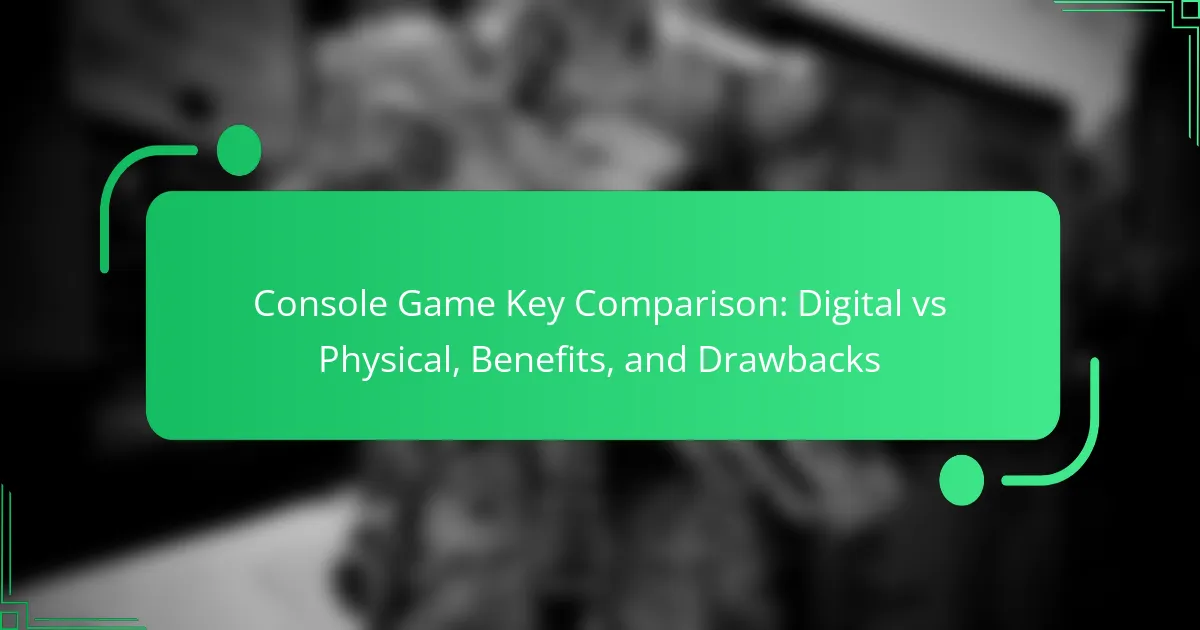Mobile gaming provides significant benefits, including enhanced social interaction, improved cognitive skills, and high entertainment value. Players connect through collaborative gameplay and real-time communication, fostering relationships. These games challenge problem-solving and strategic thinking, leading to cognitive enhancement. Additionally, diverse genres cater to various preferences, ensuring engaging experiences for players of all ages.
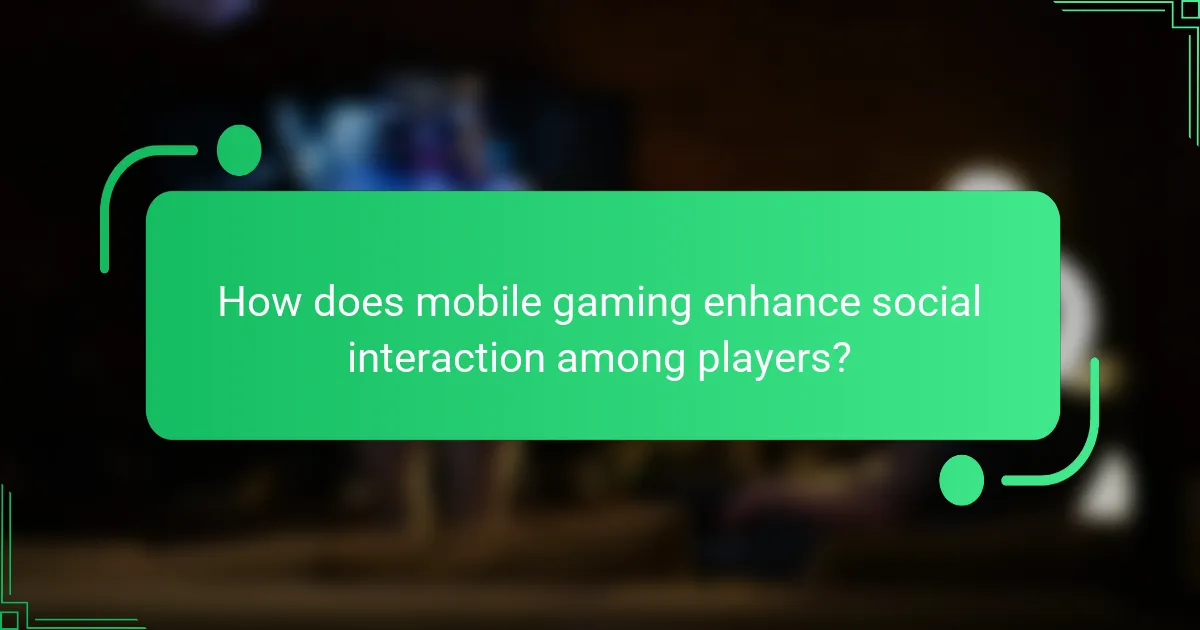
How does mobile gaming enhance social interaction among players?
Mobile gaming enhances social interaction by connecting players across distances, fostering relationships through collaborative gameplay. Players engage in real-time communication, forming communities around shared interests. This interaction strengthens social bonds and promotes teamwork. Additionally, mobile games often include features like chat functions and social media integration, further facilitating connections among players. As a result, mobile gaming serves as a platform for social engagement, enhancing player experiences and relationships.
What types of social features are commonly found in mobile games?
Mobile games commonly feature social interaction, enhancing player engagement and community building. Key social features include multiplayer modes, chat functionalities, friend lists, and leaderboards. These elements foster competition and collaboration among players. Additionally, in-game events and social media integration allow for shared experiences and broader community interaction.
Why do players prefer multiplayer experiences in mobile gaming?
Players prefer multiplayer experiences in mobile gaming for enhanced social interaction, cognitive engagement, and entertainment value. Multiplayer games foster community, allowing players to connect and collaborate. This social aspect increases enjoyment and satisfaction. Additionally, multiplayer formats challenge cognitive skills through teamwork and competition, promoting strategic thinking. The dynamic nature of these games keeps players engaged, offering varied experiences that single-player modes often lack.
How do mobile games facilitate connections across different demographics?
Mobile games foster connections across demographics by promoting social interaction, enhancing cognitive skills, and providing entertainment. These games often include features like chat functions and cooperative gameplay, allowing players from diverse backgrounds to collaborate and communicate.
Research indicates that approximately 50% of mobile gamers engage with others, creating friendships and community bonds. This social aspect is crucial, as it bridges generational gaps, enabling younger and older players to connect through shared interests.
Moreover, mobile games often incorporate cognitive challenges, which appeal to various age groups and skill levels. This shared engagement in problem-solving and strategy can strengthen relationships among players.
In summary, mobile games serve as a platform for social interaction, cognitive development, and entertainment, effectively connecting different demographics through shared gaming experiences.
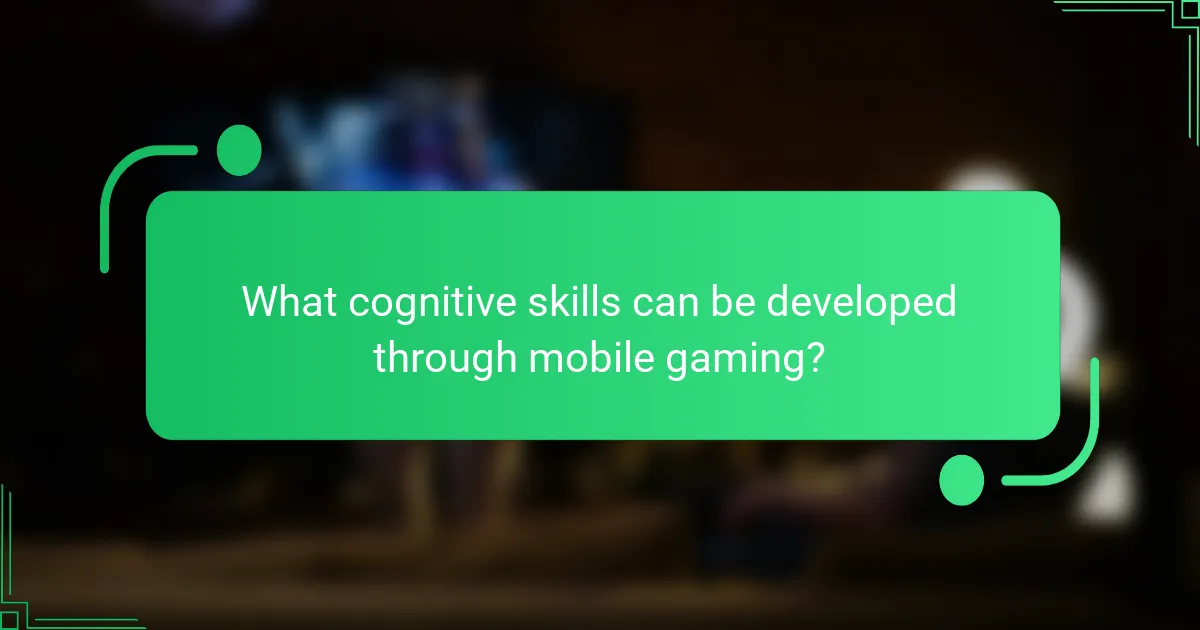
What cognitive skills can be developed through mobile gaming?
Mobile gaming can enhance various cognitive skills, including problem-solving, memory, and strategic thinking. These games often require players to think critically and adapt to changing scenarios. For example, puzzle games improve spatial awareness and memory retention. Action games can enhance reaction times and decision-making skills through fast-paced challenges. Additionally, multiplayer games foster teamwork and communication abilities, as players must coordinate with others to achieve objectives.
Which cognitive benefits are most frequently reported by mobile gamers?
Mobile gamers frequently report cognitive benefits such as improved problem-solving skills, enhanced memory, and better multitasking abilities. These skills are developed through strategic gameplay and quick decision-making processes. Research indicates that mobile gaming can stimulate cognitive functions, leading to increased mental agility. Additionally, social interaction during gaming fosters teamwork and communication skills, further enhancing cognitive development.
How does gameplay complexity influence cognitive skill development?
Gameplay complexity enhances cognitive skill development by challenging players to solve problems, strategize, and adapt. Complex games require critical thinking and decision-making, fostering skills like memory retention and spatial awareness. Research shows that engaging with intricate gameplay can improve attention spans and multitasking abilities. As a result, mobile gaming serves as a valuable tool for cognitive growth.
What role does problem-solving play in mobile gaming?
Problem-solving enhances mobile gaming by fostering cognitive skills and social interaction. Engaging in strategic gameplay requires players to analyze situations, develop solutions, and adapt to challenges. This process sharpens critical thinking and decision-making abilities. Furthermore, multiplayer games encourage collaboration, building social connections among players. These benefits contribute to the overall entertainment value of mobile gaming, making it a rewarding experience.
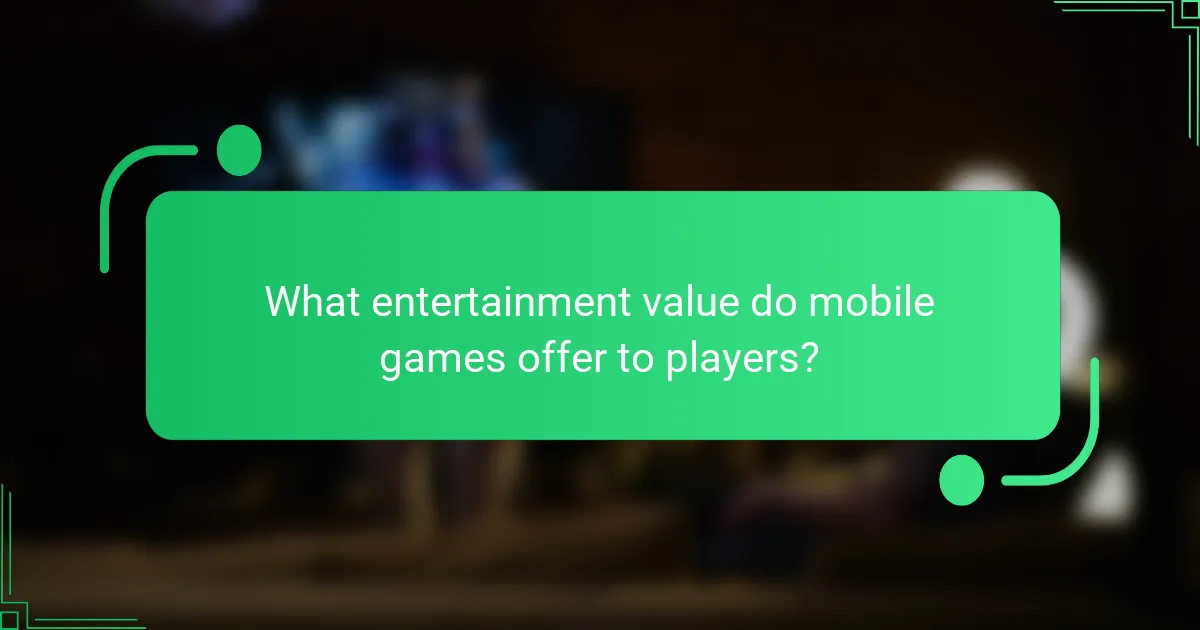
What entertainment value do mobile games offer to players?
Mobile games offer significant entertainment value through social interaction, cognitive skill enhancement, and immersive experiences. Players engage with others, fostering community and teamwork. These games stimulate critical thinking and problem-solving, improving cognitive skills. Additionally, diverse genres provide unique experiences, catering to various preferences and ensuring lasting entertainment.
How do mobile games cater to diverse entertainment preferences?
Mobile games cater to diverse entertainment preferences by offering various gameplay styles, social features, and cognitive challenges. They provide social interaction through multiplayer modes and community engagement. Cognitive skills are enhanced via strategic thinking and problem-solving in many games. The entertainment value is amplified by immersive graphics and storylines, appealing to different player interests.
What are the most popular genres of mobile games in 2025?
In 2025, popular mobile game genres include action, puzzle, strategy, and role-playing games. These genres enhance social interaction, cognitive skills, and provide entertainment value. Action games often foster teamwork, while puzzle games stimulate critical thinking. Strategy games improve planning abilities, and role-playing games encourage creativity and social engagement.
How do in-game rewards enhance player engagement and enjoyment?
In-game rewards significantly enhance player engagement and enjoyment by providing motivation and a sense of achievement. These rewards, such as virtual currency or exclusive items, encourage players to continue participating in the game. As a result, players experience increased satisfaction and a deeper connection to the game.
Rewards also foster social interaction by enabling players to share achievements with friends, enhancing the overall gaming experience. This social aspect can lead to collaborative gameplay, where players work together to achieve common goals.
Moreover, in-game rewards can improve cognitive skills by challenging players to strategize and make quick decisions. This stimulation can lead to better problem-solving abilities and increased focus.
Ultimately, the integration of in-game rewards creates a more immersive and enjoyable mobile gaming environment, driving both engagement and entertainment value.
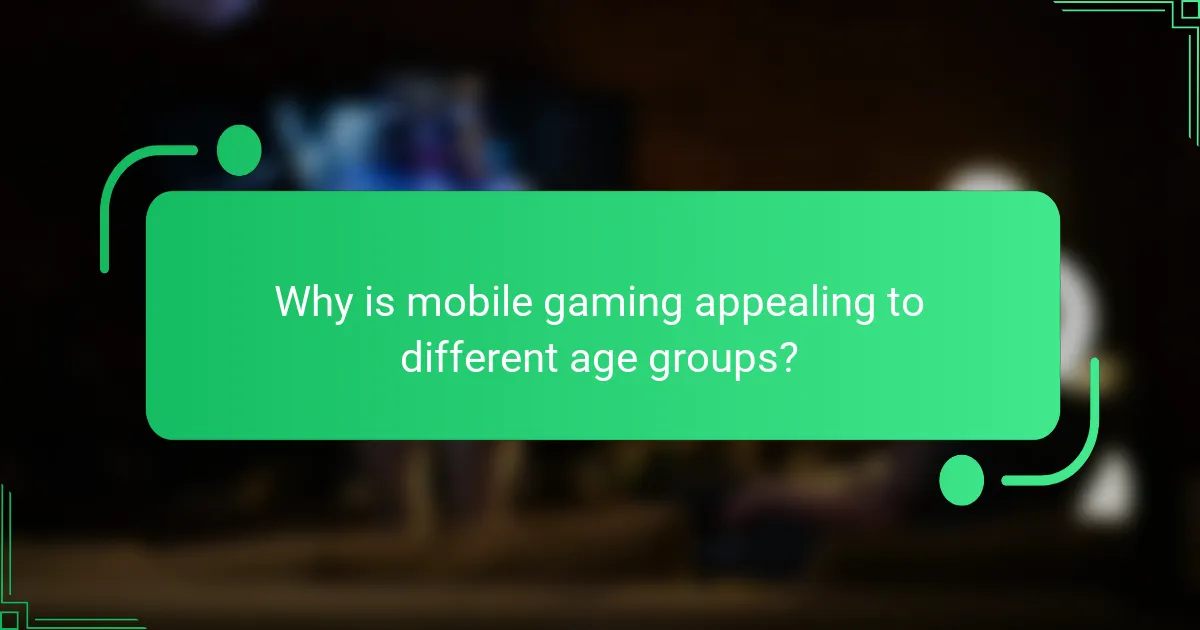
Why is mobile gaming appealing to different age groups?
Mobile gaming appeals to different age groups due to its social interaction, cognitive benefits, and entertainment value. Younger players enjoy connecting with peers, while older adults appreciate mental stimulation.
Social interaction fosters friendships and community engagement. Cognitive skills are enhanced through problem-solving and strategic thinking. Entertainment value provides a fun escape from daily routines.
These attributes create a diverse appeal, engaging users across generations with varying interests and preferences.
What unique attributes attract younger audiences to mobile gaming?
Unique attributes attracting younger audiences to mobile gaming include social connectivity, immersive experiences, and accessibility. Social interaction fosters community through multiplayer features and social media integration. Cognitive skills are enhanced through strategic gameplay and problem-solving challenges. Entertainment value is driven by diverse game genres and engaging narratives.
How do older players engage with mobile games differently?
Older players engage with mobile games through enhanced social interaction, improved cognitive skills, and a significant entertainment value. They often prioritize games that foster connections with family and friends.
Social interaction plays a crucial role for older players, as they seek games that allow them to connect with others. Many enjoy multiplayer games or social platforms that encourage collaboration and communication.
Cognitive skills are another focus. Older players tend to favor games that challenge their problem-solving abilities and memory, which can contribute positively to mental agility. Research indicates that engaging in these games can help maintain cognitive function.
Entertainment value remains a top priority. Older players often choose games that provide relaxation and enjoyment rather than competitive stress. They appreciate narratives and themes that resonate with their life experiences, enhancing their overall gaming satisfaction.
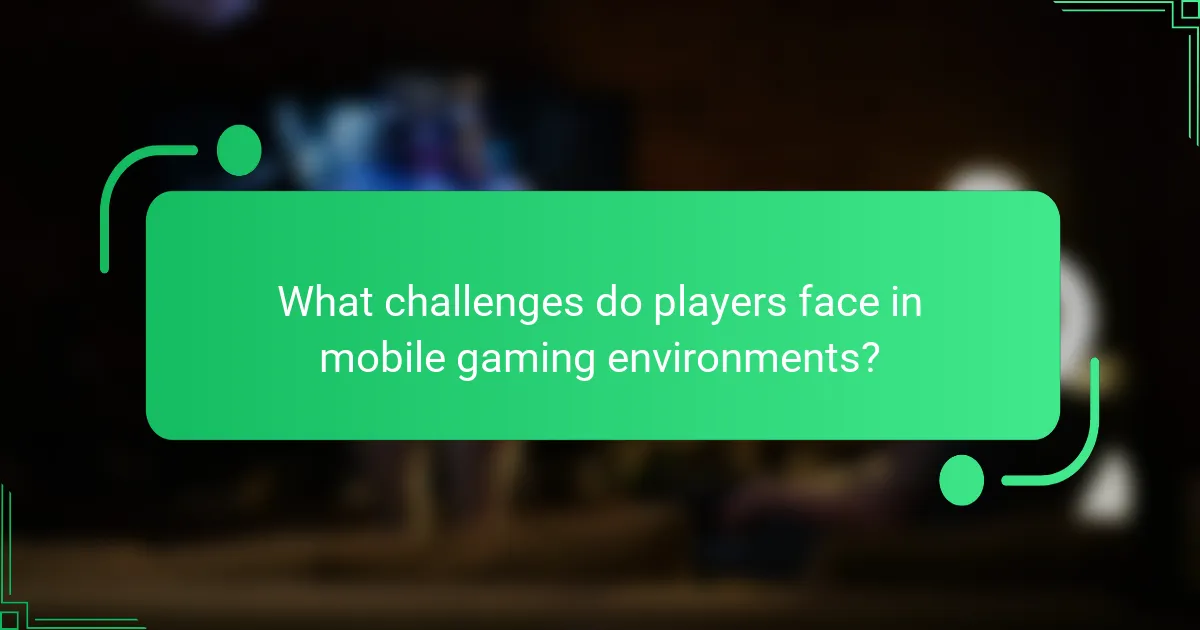
What challenges do players face in mobile gaming environments?
Players in mobile gaming face challenges including connectivity issues, device limitations, and distractions. These factors can hinder gameplay quality and social interaction. Connectivity issues often lead to lag or disconnections, impacting the overall experience. Device limitations, such as battery life or processing power, can restrict gameplay options. Additionally, external distractions, like notifications or environmental noise, can disrupt focus and cognitive engagement.
How do in-game purchases affect the gaming experience?
In-game purchases can enhance the gaming experience by providing players with customization options and access to exclusive content. These purchases often foster social interaction by allowing players to share unique items or achievements. Additionally, they can improve cognitive skills by encouraging strategic thinking and resource management. However, excessive reliance on in-game purchases may lead to frustration or imbalance in gameplay, impacting overall enjoyment.
What are common technical issues encountered by mobile gamers?
Mobile gamers commonly encounter issues such as connectivity problems, device compatibility, performance lags, and battery drain. These technical challenges can disrupt social interaction and cognitive engagement during gameplay.
Connectivity problems often arise from unstable internet connections, affecting multiplayer experiences. Device compatibility issues may prevent games from running smoothly on older devices. Performance lags can result from heavy graphics or insufficient memory, hindering entertainment value. Battery drain is a frequent concern, as intense gaming sessions can quickly deplete power.

How can players maximize the benefits of mobile gaming?
Players can maximize the benefits of mobile gaming by engaging socially, enhancing cognitive skills, and choosing diverse entertainment options. Social interaction fosters connections through multiplayer games and online communities. Cognitive skills improve through strategic gameplay and problem-solving challenges. Entertainment value increases with varied genres and immersive experiences. Regularly exploring new games can enhance these benefits further.
What best practices should be followed for healthy gaming habits?
To maintain healthy gaming habits, players should balance gaming with other activities, set time limits, and engage in social interactions. Regular breaks help prevent fatigue and enhance cognitive skills. Staying aware of emotional responses during gaming can also improve the overall experience.
Which strategies enhance social interaction and cognitive skills in mobile gaming?
Mobile gaming enhances social interaction and cognitive skills through cooperative gameplay, communication features, and problem-solving challenges. These strategies foster teamwork and critical thinking among players.
Cooperative gameplay encourages players to work together to achieve common goals. This interaction builds social bonds and improves interpersonal skills. Communication features, such as chat systems and voice calls, facilitate real-time interaction, promoting social engagement.
Problem-solving challenges in mobile games stimulate cognitive skills. Players must strategize and think critically to overcome obstacles, enhancing their analytical abilities. These elements collectively contribute to a more engaging and mentally stimulating gaming experience.


